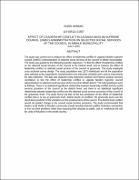| dc.contributor.author | Nura, Ahmad | |
| dc.date.accessioned | 2017-06-30T07:18:58Z | |
| dc.date.available | 2017-06-30T07:18:58Z | |
| dc.date.issued | 2015 | |
| dc.identifier.citation | Nura, A. (2015) Effect of Leadership Conflict in Uganda Muslim Supreme Council (Umsc) Administration On Selected Social Services of the Council in Mbale Municipality July 2015.Thesis (Masters). Islamic University in Uganda. | en_US |
| dc.identifier.uri | http://hdl.handle.net/20.500.12309/373 | |
| dc.description.abstract | The study was carried out to analyze the effect of leadership conflict in Uganda Muslim supreme council (UMSC) Administration on selected social services of the council in Mbale municipality. The study was guided by the following specific objectives. To find the effect of leadership conflict on the selected social services of the council at the District level, and to measure the effect of leadership conflict on selected social services of the council at grassroots. The study employed cross sectional survey design. The study population was (157) individuals and all the population were selected as the respondents. Questionnaires and interview schedule were used as instruments for data collection. The data was analyzed using regression analysis and Pearson product moment correlation to test the effect of leadership conflict in Uganda Muslim Supreme council administration on selected social services of the council in Mbale district. The null hypotheses were as follows. There is no statistical significant relationship between leadership conflict and the social services provision of the council at the district level, and there is no statistical significant relationship between leadership conflict and the selected social services provision of the council at the grassroots level. The study found out that of the two predictors of the effect of leadership conflict that is to say at grassroots level, district levels of conflicts; the grassroots level was the stand alone predictor of the variations on the social services of the council. The district level conflict would not predict change in the council social services provision. The study recommended that leaders at all levels of Muslim community should develop internal conflict resolution mechanism to iron out their problems rather than exposing their disputes to public, and re- emphasize the call for unity of Muslims in the whole country. | en_US |
| dc.language.iso | en | en_US |
| dc.subject | Leadership Conflict | en_US |
| dc.subject | Uganda Muslim Supreme Council | en_US |
| dc.subject | Administration | en_US |
| dc.subject | Social Services | en_US |
| dc.title | Effect of Leadership Conflict in Uganda Muslim Supreme Council (Umsc) Administration On Selected Social Services of the Council in Mbale Municipality July 2015 | en_US |
| dc.type | Thesis | en_US |

